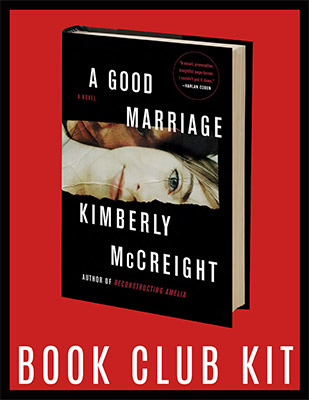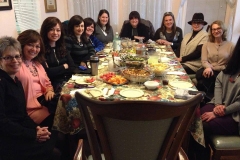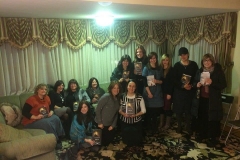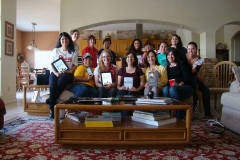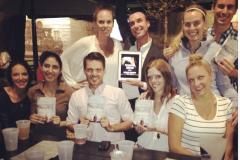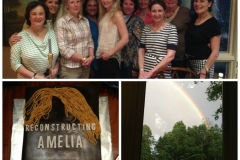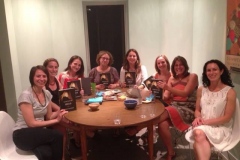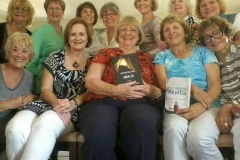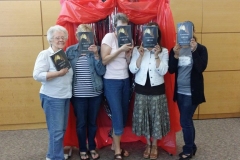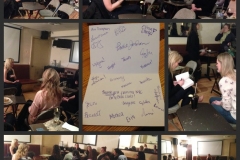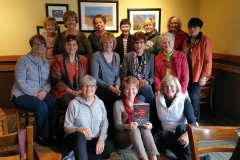Discussion Questions
A Good Marriage Discussion Questions
- What makes a good marriage?
- What does being “happily married” mean?
- Do you believe in white lies?
- Do you think you ever completely know a person?
- Whether married yourself or not, what do you think is the hardest part about being married? Zach says at one point: “The hardest part of marriage is the way someone else’s problems become your own.” Do you agree with this statement?
- At one point, Sarah says: “A good marriage is the one that survives.” Do you think that’s true? Is staying together one measure of a good marriage?
- Are there certain things—like shared hobbies or a similar sense of humor or compassion—that are absolute pre-requisites for a good marriage?
- There is a party in A Good Marriage where some sexually adventurous activity takes place. Do you think these kinds of parties happen in your neighborhood? What do you think about the couples who participate? Could they have good marriages?
- Would anyone find anything incriminating on your computer if they hacked into it? Discuss.
- There are several different archetypes of marriage presented in the novel. What are they? And do you think one type is better than the other?
- Amanda decides toward the end of the book that she no longer owes Zach anything, despite the fact that he really did rescue her and also provides for her financially. Do you think she is obligated to continue to stay with him for those reasons? Do you think she ever was?
- Are there certain things you should never tell your partner in order to protect their feelings?
- Do you think some mystery is good in a relationship?
- Do you think that Lizzie has a good marriage?
- Lizzie has stayed with Sam for a long time, despite his alcohol addiction. Do you think this is a good decision or a bad one? What role does co-dependency play in their relationship?
- Do you think Lizzie and Sam’s marriage will survive? Should it?
- What would you do if you got a call from an old friend like Zach? Would you help him if you could?
- Why do you think that Zach does the things he does?
Reconstructing Amelia Discussion Questions
- What is Amelia’s relationship like with her mother? Why doesn’t she share more with Kate? Why are adolescents often so reluctant to talk to their parents about the events in their lives—especially problems they are having with friends?
- Describe Amelia. Is she a typical teenager? Talk about her friendship with Sylvia. What drew the girls together? What about her relationships with Zadie and Dylan? What made her feel so close to her Internet friend, Ben?
- Might Amelia’s situation have been different if she’d had a larger family around her? What if that family had been larger, but more filled with conflict?
- Is Kate a good mother? She believes she knows her daughter well, but does she? What does she discover about Amelia that surprises her? What does she discover that confirms her deepest beliefs about Amelia and their relationship?
- What kind of a support network does Kate have to rely on? Does she bear any blame for the events that occur? Is there any way she could have prevented the tragedy? What about Grace Hall—how much, if any, responsibility does the school bear for Amelia’s death? Who can you turn to for help in handling a problem involving your child?
- Why is being popular so important in adolescence? Has the Internet and social networking added to the pressures teenagers must cope with?
- What impact does class play in the story? What about sexuality—Amelia’s recognition of her own desires? What about Amelia’s need to be perfect—her drive to be a good student?
- Why does such a smart girl like Amelia fall into the trap of the secret clubs? Why isn’t she more suspicious of the Magpies and the boys around them? How did her keeping the secret about the Maggies impact her relationship with Sylvia? Why are some children cruel to others? Did your school have a hierarchy or clubs like the Magpies? Where did you fit it?
- If you have a child, how much do you know about his or her life? How far should parents go to monitor their child’s life? Do children have a right to privacy the way adults do? What might someone learn if they tried to “reconstruct” you from your emails, correspondence, texts, tweets, messages, blog posts, and Facebook updates? Does social media make us too connected? What is your opinion of social media—do you think it’s a positive development or an erosion of who we are and how we interact?
- How does the author ratchet up the suspense in the story? What clues does she provide to point you toward the truth—or away from it?
- Bullying is a major topic across the media and throughout society. Do you believe it is a serious issue, or do you think it’s a phase that all children go through? How has the rise of the Internet contributed to the severity of bullying and to our awareness of it? Can we decrease the incidents of bullying? How do we learn to stand up to mean people?
- Does Kate get closure when she discovers the truth? Where do you think she will go from here?
- What inspired you or your group to choose Reconstructing Amelia? Did it meet your expectations? Is it an accurate representation of modern parenting and growing up in twenty-first century America? What did you take away from reading the book?
Where They Found Her Discussion Questions
- In what ways is Molly prepared, or not, to report on the tragic discovery in Ridgedale?
- How does Molly’s job as a journalist compare with her previous one as a lawyer? In what ways are the skills required the same? Different?
- In what situations might a newspaper editor be justified in not publishing certain facts of a story? What are a paper’s social responsibilities?
- Examine the many different experiences of motherhood in the novel. What are the various challenges of each?
- How does shifting between several narrative voices affect the novel? Why do you think an author might use this technique?
- Consider the use of newspaper articles, readers’ online comments, Molly’s counseling transcripts, even phone texts in the novel. What does each bring to the story? How are these sources of information different?
- After her initial shock, Molly comes to believe covering the story of a baby that has died will help her recover from the death of her own baby. Why does she feel this way? What’s a healthy and effective way to respond to grief?
- Erik cautions Molly that it’s human nature for even good, honest people to “support…a self-serving narrative,” even to the point of excluding facts. Why is this so?
- What are some examples of lying in the novel? Are they all equal? When is lying justified?
- Steve, Ridgedale’s chief of police, has a very complicated position in the case. What different forces and loyalties are at work within him as he investigates?
- How has the technological ability for readers to offer immediate online comments about articles changed the nature and effect of reading the news?
- Barbara says that her husband Steve and daughter Hannah have “compassion [as] their strength” but suggests “all this caring for strangers came at a cost.” What might she mean? What is a healthy amount of compassion?
- Molly wrestles with the idea that “not everything about where you’re headed…has to be about where you’ve been.” To what extent does a person’s past influence or define his or her future?
- Both Molly and Sandy have had very troubled mothers. What are the emotional or behavioral results of this poor parenting? What does it take to overcome such a start in life and become healthy and happy?
- Sandy shows incredible strength throughout the novel. What qualities does she possess? Did her strengths develop because of or despite her difficult childhood?
- In a discussion about Cole, Barbara yells at Rhea that she cannot understand the situation because she does not have children. To what extent is this true?
The Outliers Discussion Questions
- The Outliers opens with a question: “Why are the bad things always so much easier to believe?” Why do you think Wylie feels this way? Is it a result of so much tragedy in her life? Or is this something broader, and more general?
- Wylie’s grandmother was committed to an institution for mental illness; Cassie’s father is an alcoholic; Jasper’s father is in prison. What role does inheritance play in the novel? Is it inevitable that these teenagers will fall into the same fate as their relatives? Or does the knowledge of these histories allow room for prevention?
- Grief hovers over the Lang household after the loss of Wylie’s mother. Examine the methods Wylie, her father, and Gideon use to deal with—or not deal with—their loss. What are the benefits and downsides of their coping mechanisms?
- Is Wylie’s initial impression of Jasper justified? Does it stem from something beyond Cassie’s spiraling out of control?
- Why do you think Wylie’s friends in middle school really turned against her, and why does Cassie join them, despite knowing this? What does this say of teenage “group dynamics”?
- What kind of role do you think anxiety plays in the lives of teenagers today? Do you think there are differences in the ways girls and boys experience anxiety? Do you think these differences are real, or are more a matter of perception?
- A major theme in The Outliers is intuition. Before she learns the truth about her identity, how does going with her gut help Wylie? How does it work against her?
- Wylie’s dad tells Gideon that “what a scientist wants is irrelevant. The only thing that matters is the truth.” Even though he stresses this, what do you think Dr. Lang really wants to come from his work?
- Do you think Outliers will change the world? Should their powers be smothered, or utilized?
- Do you believe in intuition yourself? Do you rely on it in your everyday life? If so, how? If not, why not?
- If you could be an Outlier would you want to be?
Book Club Visits
To invite Kimberly to join your book club discussion via Skype or phone, send her an email using the form below.

 NAV
NAV